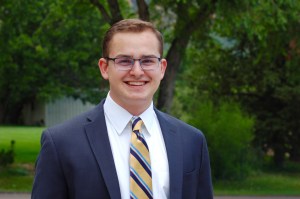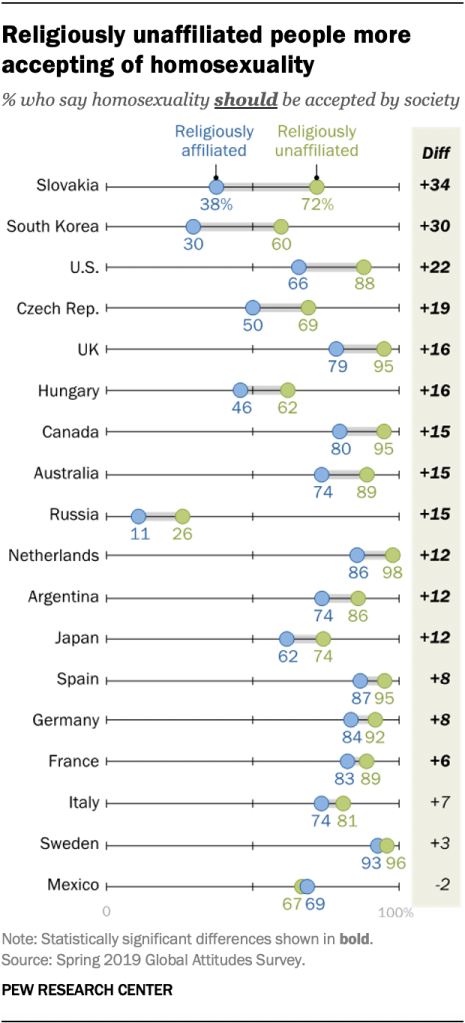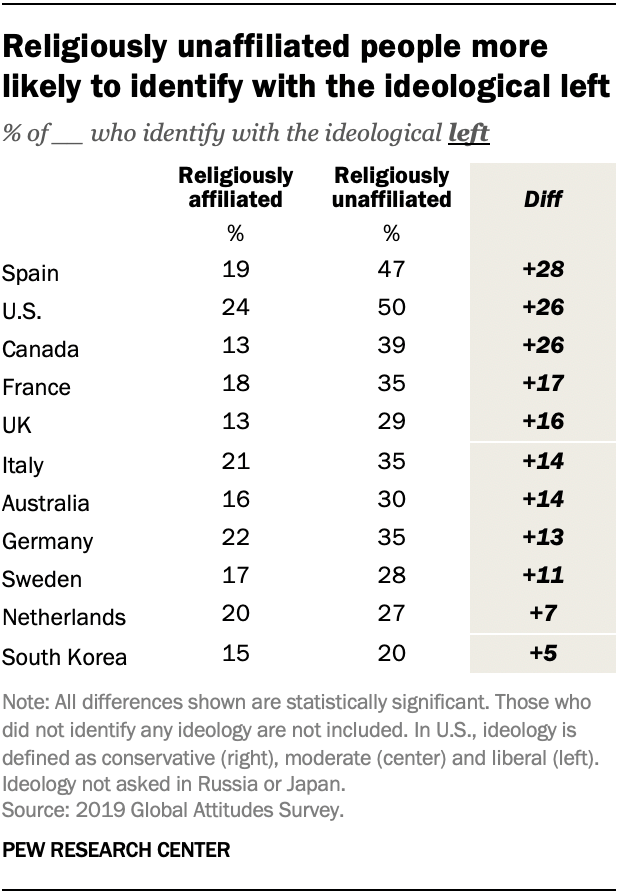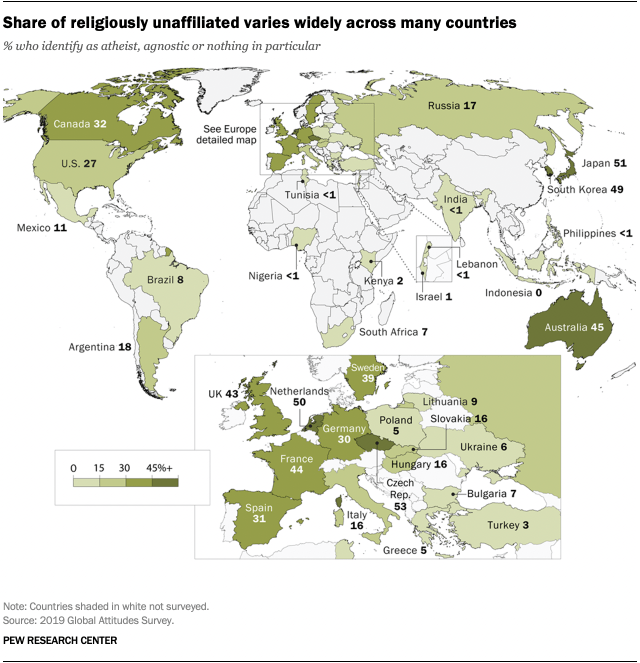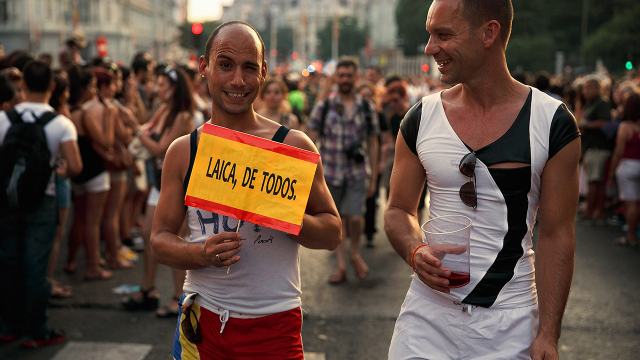
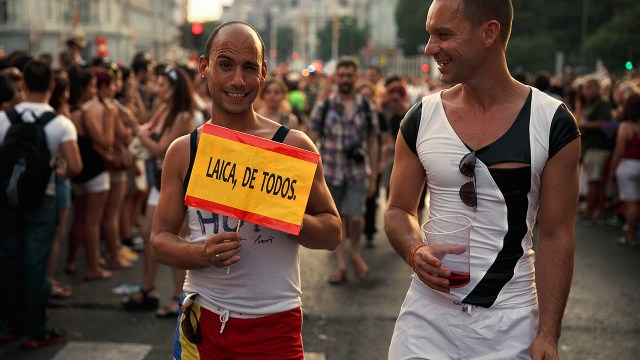
Most people around the world identify with a religion or religious group. The rest, an estimated 16% of the global population in 2020, are religiously unaffiliated, meaning they identify as atheists, agnostics or describe their religion as “nothing in particular.”
In many countries, being religiously unaffiliated is linked to certain social and political views. For example, in some countries, religiously unaffiliated adults – a group also known as religious “nones” – are more likely to express accepting views of homosexuality, less likely to prefer traditional gender roles in marriages, and more likely to identify with the political left than are adults who identify with a religion, according to a 2019 Pew Research Center survey.
The survey included 34 countries, 18 of which had samples of religiously unaffiliated adults that were large enough to be analyzed.
In most of these 18 countries, religiously unaffiliated adults were more likely than those who identify with a religion to say homosexuality should be accepted by society.
For example, in South Korea, 60% of religious “nones” say homosexuality should be accepted by society, compared with 30% of religiously affiliated adults who say the same. Significant gaps also occur in Slovakia (34 percentage points), the United States (22 points), the Czech Republic (19 points) and even Russia (15 points), where acceptance of homosexuality is far less widespread across society.
Pew Research Center has long tracked demographic trends among the religiously affiliated and unaffiliated as well as the behaviors and beliefs associated with people in those groups. This post draws on data from a Pew Research Center survey conducted across 34 countries from May 13 to Oct. 2, 2019, among 38,426 respondents. The survey was conducted face to face across Africa, Latin America, the Middle East and South Asia, and on the phone in North America and in the Asia-Pacific region. Across Europe, the survey was conducted over the phone in France, Germany, the Netherlands, Spain, Sweden and the UK, but face to face in Central and Eastern Europe, Italy, Ukraine and Russia. In 18 of the 34 countries surveyed, there were a sufficient number of respondents who identified as atheist, agnostic or “nothing in particular” for additional subgroup analysis.
The questions used for this report can be found here, here, and here, along with responses, and its methodology.
Religiously unaffiliated people also tend to differ from those who identify with a religion when it comes to how they view gender roles in families. When asked what kind of marriage is a more satisfying way of life, religious “nones” in some countries analyzed are more likely than those who identify with a religion to prefer one where both the husband and wife have jobs and together take care of the household. And unaffiliated adults in 11 countries are less likely to say a marriage where the husband provides for the family and the wife takes care of the house and children is more satisfying.
In addition, religiously unaffiliated people in many countries analyzed are more likely than those who identify with a religion to place themselves on the political left. This difference is most pronounced in Spain, where 47% of unaffiliated people put themselves on the ideological left, compared with just 19% of those identifying with a religion. Double-digit differences also appear in the U.S., Canada, France, the UK, Italy, Australia, Germany and Sweden.
These patterns are not universal. For example, in Sweden, about equal shares among the religiously unaffiliated and those who identify with a religion say homosexuality should be accepted by society (96% vs. 93%, respectively). Additionally, affiliated and unaffiliated adults are about equally likely to place themselves on the ideological left in several countries, including Argentina and Mexico.
When it comes to views about the importance of freedom of religion, there is no clear national pattern of differences between religiously affiliated and unaffiliated people. In seven of the countries analyzed – Argentina, Australia, Hungary, Mexico, the Czech Republic, South Korea and Slovakia – religious “nones” are less likely than religiously affiliated people to say it is very important that people in their country can practice their religion freely. In the other countries analyzed, there are no significant differences between the religiously unaffiliated and those who identify with a religion on this question.
Across the complete set of 34 countries surveyed in 2019, the share of religious “nones” varies, from less than 1% of the population in six countries (India, Indonesia, Lebanon, Nigeria, the Philippines and Tunisia), to around three-in-ten in the United States (27%), Germany (30%), Spain (31%) and Canada (32%), to roughly half the populations in South Korea (49%), Japan (51%) and the Czech Republic (53%) (these numbers can be quite sensitive to interviewer effects and question wording).
The absolute number of religious “nones” worldwide is expected to increase slightly from 1.17 billion in 2015 to 1.2 billion in 2060, according to Pew Research Center projections. However, since other religious groups are projected to grow much faster, the global share of religiously unaffiliated people is expected to fall from 16% to 13% of the global population over the same time period.
Note: The questions used for this report can be found here, here, and here, along with responses, and its methodology.
